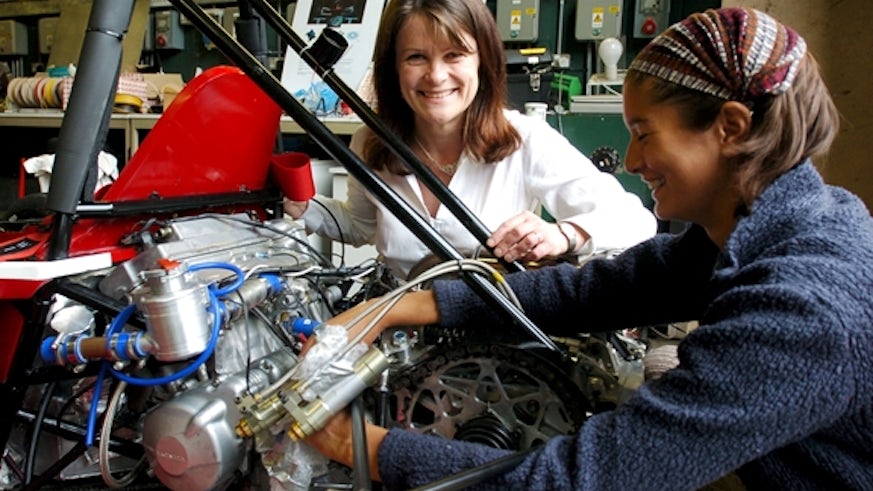Inspiring the next generation of women engineers
25 June 2015

As part of a very successful event featuring presentations celebrating National Women in Engineering Day, Professor Karen Holford, Pro-Vice Chancellor for the College of Physical Sciences and Engineering, explained why she became interested in science, and why she believes more women should consider engineering as a career.
“There has never been a more exciting time to embark on a career in engineering. Society relies on technology more than ever; engineers and scientists are the people who solve global challenges such as developing sustainable energy sources, enabling access to clean water and developing health solutions for an ageing population. They also allow us to have high-tech equipment like mobile phones, advanced computers, faster cars and aeroplanes, 3D printers and much, much more.
As an engineer you can travel all over the world, work with fascinating people and become involved in a wide-range of really exciting projects. Furthermore, you get the chance to develop technology that has a genuine impact on our everyday lives.
However, as it stands, Wales needs to increase efforts to encourage more people into the profession.
The Royal Academy of Engineering has estimated that Wales will need to provide an extra 2,500 engineering graduates over the next five years to plug the gap left by engineers who are retiring.
Similarly, a recent report showed that Welsh universities need to recruit 600 additional academics in science and technology if they are to secure a bigger share of funding from UK research funding sources.
If we can meet these demands, Wales will become a more attractive place for businesses, creating more jobs and adding significant growth to the Welsh economy.
However, it will be extremely tough to recruit these sorts of figures unless we encourage more women into engineering.
At the moment, the picture looks fairly bleak. Only about a half of female graduates with a degree in science, technology, engineering or maths (the STEM subjects) actually go on to work in one of these fields, compared with over two thirds of male graduates.
As a result, it is estimated that less than 10% of the engineering workforce in the UK are female—the lowest percentage in Europe.
As part of 'National Women in Engineering Day' today, organisations from all over the UK will be raising the profile and celebrating the achievements of women in engineering, and encouraging more girls (and boys) to consider engineering as a career.
If we are to make engineering an attractive prospect for girls, we must firstly dispel the myth that it is 'just for boys' and remove the stereotypes that are attached to the profession. Children's cartoons and TV programmes, for example, still portray engineers as nerds or introverts, who have no social skills and do boring jobs.
Rather than encourage children to sit in front of a TV and watch these sorts of programmes, we must engage them with the world around us, and get them asking questions.
As a child growing up, I remember my Dad calling me outside because Concorde was going to fly overhead. He explained that we might not see it but we could hear the sonic boom. When I asked him what a sonic boom was he told me to look it up in the encyclopaedia. I was an extremely curious child and I was often asking questions that people couldn't answer, so I looked for the answers myself.
My Dad had a garage so I was also very practical and used to help him out regularly. His influence, combined with my natural curiosity, kept me engaged right throughout secondary school, and I became the first person in my family to go to university.
The role of the parent is key, and we need to help them understand that a career in engineering is a good one, and more than that an exciting one.
At Cardiff University we're doing all we can to reach out and inspire the next generation of scientists and engineers through a number of different engagement projects. Just last week we had 400 students visit us from St David's Catholic Sixth Form College for a day of activities, workshops and talks around the STEM subjects.
The students were given a fresh perspective by taking them out of the classroom and into an environment where they could see the impact of science first-hand, and at the same time get a taste for university life.
'National Women in Engineering Day' gives us a great opportunity to shout about the benefits of a career in engineering, but it is important that we deliver this message throughout the year, every year, to every generation.”